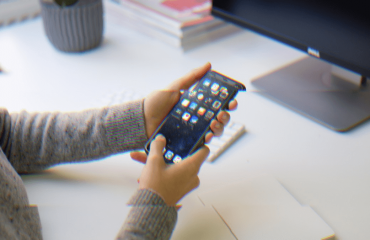All VPN users ask themselves whether it’s possible to be tracked if you are using a VPN. Let’s figure out can a VPN be tracked to ensure your online security and what happens if the Internet Service Provider (ISP) or the police track you using a VPN.
What does a VPN exactly hide?
Your IP-address is only a number, but if kept public, it tells a lot about you — your OS, the exact location, the Internet Service Provider (ISP) you’re using, and other sensitive things you’d want to keep private. Even more, the IP-address is enough to launch a DDoS attack on your computer. How does a VPN hide it?
A VPN changes your IP by connecting you to a foreign server. This way, it’s impossible to link your activity to your real location. Some VPN services allow you to choose between servers in different countries allowing you to access geo-blocked content like some websites and even TV shows on Netflix.
What about your ISP that stores all your information?
In most countries, ISPs are required by the law to store their users’ information on servers for some time. A VPN has a way of dealing with that too.
It encrypts all the requests you send to the web, so to a third-party person, as an ISP worker, it’ll look like a cipher of numbers and letters. Your device and the VPN server possess unique keys, making it impossible to extract anything for the ISP from the data they store on you.
If you use a VPN, the ISP still will store your data on their servers, but it’ll be impossible for them to understand it and use it.
Can ISP see that I'am using a VPN?
Frankly speaking, yes, they may know about it. The ISP can detect the encrypted connection you VPN settles and the changed IP address. What can they do about it? Nothing, actually. Even if a VPN can be tracked, your activity that goes through it is not. No worries here.
Can the police track a VPN? Well, it’s the same as for the ISP. They can monitor your internet traffic and detect the encryption of data, but they can do nothing about it. To them, as to the ISP, it’ll look like an incomprehensible cipher.
Can a VPN be tracked? It’s possible to detect that you’re using it, but everything you do online is private and encrypted.
What about cookies on websites you use?
A cookie is a small piece of data that helps websites recognize you. Cookies can be helpful — they make it easy to run internet stores that have to remember your wishes and shopping cart. Cookies are meant to personalize your experience and make life easier.
But that is only about the first-party cookies. It gets worse when we take a look at third-party ones. Google and Facebook use these cookies and share them with their countless partners across the web. They track lots of your activities, so you'll have relevant ads anywhere you go. And it can be pretty bothering.
A VPN itself can’t stop cookies from tracking you, but you can. It’s possible to turn off cookies wholly or partly on most browsers. Learn how to do it on Google Chrome.
What if the VPN Connection drops? Can you be detected if it happens?
Connection problems happen for different reasons. As the most obvious one, it can occur when your WiFi router gets relaunched. After you lose the connection, the VPN stops working, and your IP-address becomes visible and all the data isn’t encrypted anymore. Looks like a security gap, doesn’t it?
No need to worry if your VPN supports the Kill Switch function. When the connection drops for some reason, the VPN will turn off your internet until it reconnects to the server. The Kill-Switch helps you protect sensitive data if you’re working on something important and feel afraid that a leak can damage your work.
Can the officials detect torrenting if you use a VPN?
The peer-to-peer technology (torrenting) isn’t itself illegal, but in most countries sharing a file that is a subject of copyright may bring you some troubles. The torrent client sets your IP and the file you’re downloading visible to everybody. This way ISPs and governments can detect your activity and even launch a lawsuit against you. Can a VPN help in this situation?
Yes, that’s why we recommend using a VPN every time you want to download torrents. A VPN hides your IP address from the government and the ISP, so it’s impossible for them to know that you are downloading files via torrent. Learn about the best torrent websites.
Let’s now look at the best VPNs and they can offer to you:
FEATURES | PIA | ClearVPN | NordVPN |
| Unblock Hindi Movies Streaming | ✅ | ✅ | ✅ |
| High-Speed Connections | ✅ | ✅ | ✅ |
| AES-256 encryption | ✅ | ✅ | ✅ |
| Number of countries | 45+ | 45+ | 111 |
| No-logs policy | ✅ | ✅ | ✅ |
| 24/7 Customer support | ✅ | ✅ | ✅ |
| No of devices | 8 | 6 | 6 |
| Cost (Monthly) | $11.69 | $9.99 | $12.99 |
So is using a VPN safe?
ISPs and the police can detect that you’re using a VPN, but it’s unlikely for them to access your data. A VPN encrypts your search history, emails, passwords, and messages you send. Also, your IP-address is changed, so it’s not possible to link your web-activity to your real location. So yes, using a VPN is safe and grants you a lot of security online.



